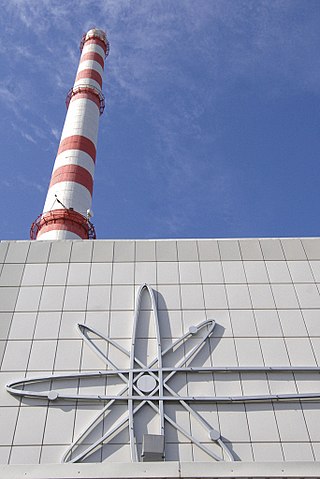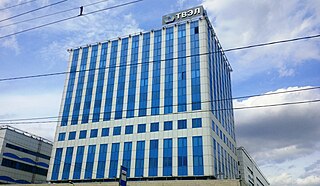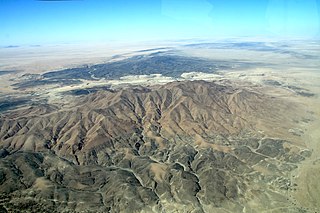
State Atomic Energy Corporation Rosatom, also known as Rosatom State Nuclear Energy Corporation,, or Rosatom State Corporation, is a Russian state corporation headquartered in Moscow that specializes in nuclear energy, nuclear non-energy goods and high-tech products. It was established in 2007 and comprises more than 350 enterprises, including scientific research organizations, a nuclear weapons complex, and the world's only nuclear icebreaker fleet.
The Urenco Group is a British-German-Dutch nuclear fuel consortium operating several uranium enrichment plants in Germany, the Netherlands, United States, and United Kingdom. It supplies nuclear power stations in about 15 countries, and states that it had a 29% share of the global market for enrichment services in 2011. Urenco uses centrifuge enrichment technology.

Russia is one of the world's largest producers of nuclear energy. In 2020 total electricity generated in nuclear power plants in Russia was 215.746 TWh, 20.28% of all power generation. The installed gross capacity of Russian nuclear reactors is 29.4 GW in December 2020.
Rosenergoatom is the Russian nuclear power station operations subsidiary of Atomenergoprom.

Atomenergoprom is a 100% state-owned holding company that unifies the Russian civil nuclear industry. It is a part of the Rosatom state corporation.
Techsnabexport, internationally known as TENEX, is an overseas trading company owned by Russian state-owned company Rosatom. Techsnabexport is an exporter of enriched uranium and a supplier of nuclear fuel cycle products.
Paladin Energy Ltd is a Western Australian based uranium production company.

The TVEL Fuel Company (TVEL) is a Rosatom-owned nuclear fuel cycle company headquartered in Moscow. It has operated since 1996.
NMMC is the largest Uzbek industrial enterprise, is involved in the mining industry, and is one of the top ten largest gold producers in the world. The company's most important gold ore deposits are located in the Kyzyl Kum Desert.
Atomstroyexport (ASE) JSC (Russian: Атомстройэкспорт) is the Russian Federation's nuclear power equipment and service exporter. It is a fully owned subsidiary of Rosatom.

Uranium One is an international group of companies, part of the management circuit of the TENEX Group of Rosatom State Corporation. Since 2013, it is a wholly owned subsidiary of Moscow-based Uranium One Group, a part of the Russian state-owned nuclear corporation Rosatom.
The mineral industry of Russia is one of the world's leading mineral industries and accounts for a large percentage of the Commonwealth of Independent States' production of a range of mineral products, including metals, industrial minerals, and mineral fuels. In 2005, Russia ranked among the leading world producers or was a significant producer of a vast range of mineral commodities, including aluminum, arsenic, cement, copper, magnesium compounds and metals, nitrogen, palladium, silicon, nickel and vanadium.

Alexander Germanovich Burutin is a retired Russian Ground Forces lieutenant general. He was a military adviser to the President of Russia from 2003 to 2007 and was First Deputy Chief of the General Staff of the Armed Forces of the Russian Federation from 2007 to 2010.

Atommash («Атоммаш») is a multidisciplinary engineering company located in Volgodonsk, Rostov Oblast, Russia. It was established in 1976 as a nuclear engineering corporation. Following privatization and bankruptcy in 1999, the industrial facilities of the enterprise were owned and managed by ZAO Energomash–Atommash, a part of the diversified engineering company Energomash.
The world's largest producer of uranium is Kazakhstan, which in 2019 produced 43% of the world's mining output. Canada was the next largest producer with a 13% share, followed by Australia with 12%. Uranium has been mined in every continent except Antarctica.

Mining is important to the national economy of Mongolia. Mongolia is one of the 29 resource-rich developing countries identified by the International Monetary Fund and exploration of copper and coal deposits are generating substantial additional revenue.

The Langer Heinrich Mine (LHM) is a large open pit mine located in the western part of Namibia in the Erongo Region. Langer Heinrich represents one of the largest uranium reserves in Namibia having estimated reserves of 57,000 tonnes of ore grading 0.055% uranium. The Langer Heinrich Mine is currently owned by Paladin Energy Ltd with a 75% stake and CNNC Overseas Uranium Holding Ltd with a 25% stake. Paladin Energy sold the 25% to the Chinese National Nuclear Corporation (CNNC) in 2014 for a reported $190 million. The mine is under care and maintenance since 2018.
The Mkuju River mine is a large open pit mine located in the southern part of Tanzania in Ruvuma Region. Mkuju River represents one of the largest uranium reserves in Tanzania having estimated reserves of 182.1 million tonnes of ore grading 0.025% uranium. The mine has been developed by Mantra Tanzania, a subsidiary of the Uranium One Group which is owned by the Russian Rosatom. In 2017 Mantra suspended further development of the project because of low uranium prices. In 2020 they announced to resume extraction by applying solution mining (in-situ recovery, which it claimed to be an eco-friendly technology, in spite of the risks it brings to the underground water reserves.
Ministry for Atomic Energy of the Russian Federation and Federal Agency on Atomic Energy, were a Russian federal executive body from 1992–2008.









